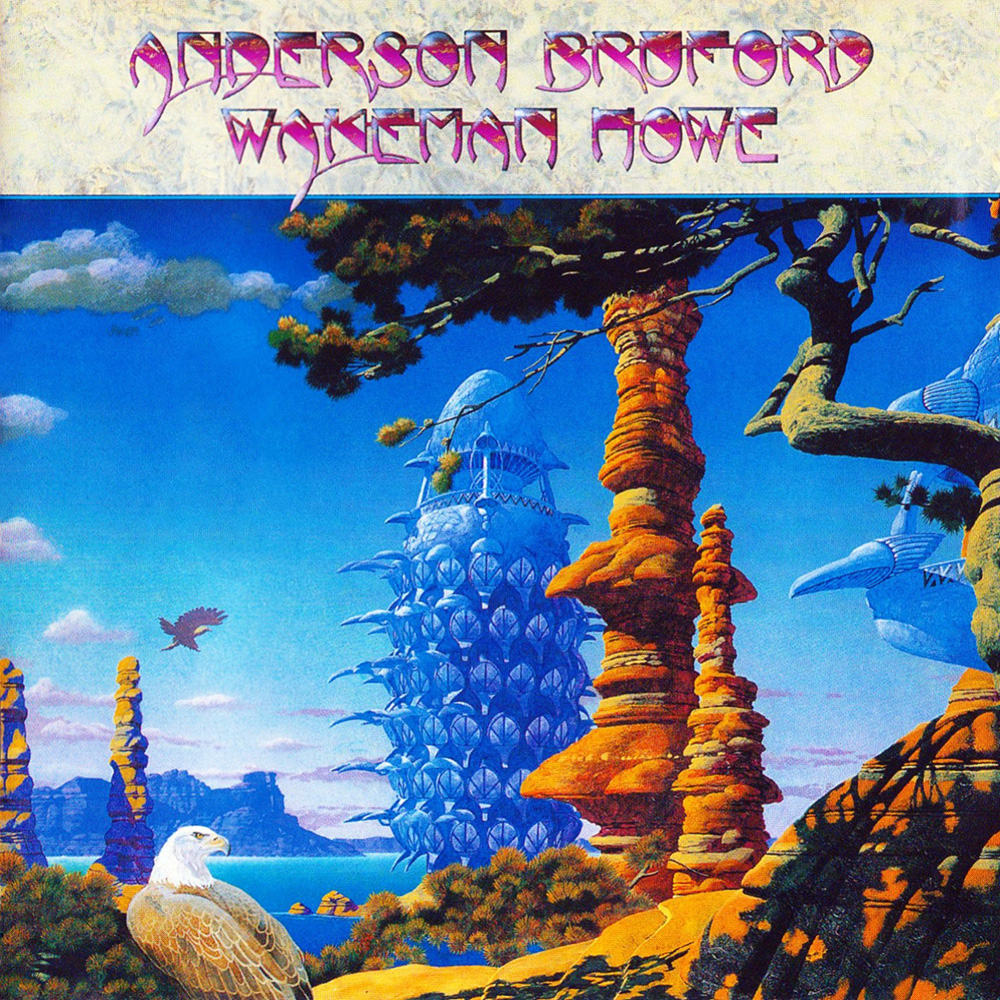
Anderson Bruford Wakeman Howe (1989)

1. Themes
2. Fist of Fire
3. Brother of Mine
4. Birthright
5. The Meeting
6. Quartet
7. Teakbois
8. Order of the Universe
9. Let's Pretend
To get technical, this is not a Yes album. However, it was supposed to be. Singer Jon Anderson was already getting restless with the current version of the band, so he desired to get some of the ‘older’ members back together and perhaps produce a record more to his liking. Well, lawyers had other ideas, and this reunited lineup wasn’t allowed to use the band name. So the guys did the next best thing, they named the band after themselves, since most everyone knew the four names and what they represented, and they then called Roger Dean to design a trippy Yes-like album cover. I’m guessing the idea was to make an album that sounded more like the early Yes records and less like the current Trevor Rabin infested 80s-like sound. Sadly, this record ends up being one huge disappointment.
First, this record does not sound like the Yes of yesteryear. No, they definitely sound like their trying to be current and relevant, but it’s quite obvious that this incarnation has no idea how to do such a thing. We’re doomed from the start. The first song, Themes, is a strong indication of what is to come. The track starts off innocently enough, with Rick Wakeman playing a nice little tingly keyboard intro. So far, not bad. Then, Bill Bruford enters the picture. Our ears are assaulted with ‘THWACK-THWACK-DUD-DU-DUD-THWACK-THWACK’!! Bruford has decided to use electronic percussion on this record, and this decision alone basically kills any enjoyment of the album as a whole. As the song progresses, it sounds more like a television advert for a Caribbean cruise as opposed to anything resemble progressive rock. When we finally hear Jon Anderson sing, it sounds much more like screaming than singing. Definitely not his forte.
After this song is over, one is thinking “surely this album has to get better…” Well, only slightly. Very slightly. The whole record sounds like the guys are trying too hard to being artsy and different. One shouldn’t expect a carbon copy of something like Close To the Edge (although many would welcome it), but whatever these guys are trying to do, it should be somewhat enjoyable to the listener, and it fails overall to do just that. In fact, had it not been for 90125 and/or Big Generator, it would be very easy to come to the conclusion that this band should have never left the 1970s.
Like those older Yes albums that everyone loves, this incarnation includes several ‘epics’ in the 7 to 10 minute range on this record, with many of these songs broken down into several different sounding ‘sections’, or ‘parts’. Sadly, not one of them works well from start to finish. There are bits of the sections in songs such as Order of the Universe and Brother of Mine that are memorable and catchy, but none of these epics sustain their listenability throughout the entire length of the respected track.
In fact, the best pieces on this album, are the short, almost inconsequential bits. The Meeting and Let’s Pretend have the most sustainability. Not because they’re short, but because they seem to highlight the best of the best when one thinks of the Yes sound. No overplayed Rick Wakeman keyboards, No headache inducing electronic Bruford noise (he must have only been in this thing for the money), just some gentle singing by Anderson atop some soft synthesizer and Steve Howe acoustic guitar playing.
While I’m griping, what’s up with Steve Howe? Maybe it’s my imagination, but as I write this review, I can’t even recall anything that the guy did on this record with any sort of lasting influence. They are very few guitar chops on this record. One must wonder if he was even in the recording studio much of the time. The record is also sadly missing Chris Squire. The bass player they use is Tony Levin (Bruford’s bandmate from his other band, King Crimson), but nothing about Levin’s playing here stands out and it’s not the slightest bit interesting.
They toured, of course. Fortunately (and obviously) they played a lot of old Yes songs. For a group and album that was supposed to be somewhat of a statement towards the most recent incarnation of Yes, these guys certainly didn’t do themselves any favors. They alienated most of the old without bringing in any of the new.
Go to the Next Review
Go back to the main page